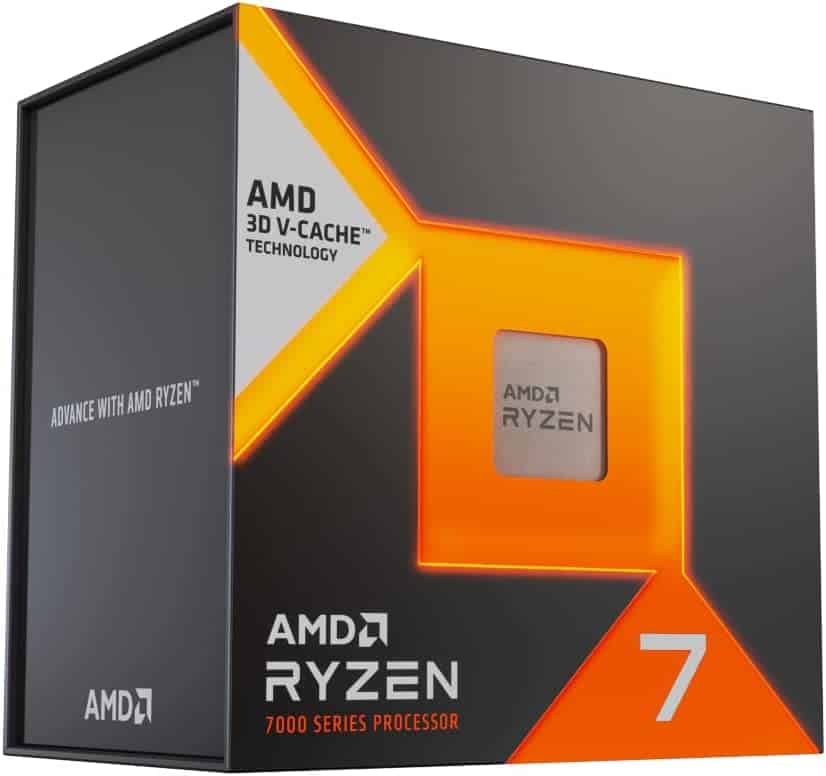You can trust VideoGamer. Our team of gaming experts spend hours testing and reviewing the latest games, to ensure you're reading the most comprehensive guide possible. Rest assured, all imagery and advice is unique and original. Check out how we test and review games here
AMD Ryzen 7 7800X3D

Cores
8
Threads
16
Base speed
4.2GHz
Boost speed
5.9GHz
Cache
104MB
TDP
120W
You may be wondering what’s the difference between Ryzen 7 7800X3D vs 7 7700X and we’re here to break it down.
The release date of the next CPU in the Ryzen 7 7000 Series falls on April 6th, meaning we’re finally able to get our hands on the Ryzen 7 7800X3D and we’re confident it will be worth it.
It makes use of Ryzen’s 3D V-Cache technology to provide a staggeringly large 96MB of L3 cache. This makes it great for gaming. It’s also on the more budget-friendly side of things, making for an even more tempting offer.
If you are thinking of going for it, it makes sense to see how it is shaped up against other CPUs in a similar price range. The Ryzen 7 7700X is just that. While it does have a smaller cache size, its performance elsewhere is very similar and it even outmaneuvers the 7800X3D in some areas.
We’re comparing these two chips in order to give you an overview of them both, and allow you to make your own decision as to which one makes the most sense to you, rather than crowing a ‘winner’. To do this we’ll break down our comparison of each in several key areas. Let’s get into it.
Ryzen 7 7800X3D vs Ryzen 7 7700X – specs comparison
| Specs | Ryzen 7 7800X3D | Ryzen 7 7700X |
| Architecture | Zen 4 | Zen 4 |
| Core Count | 8 | 8 |
| Thread Count | 16 | 16 |
| Base Clock | 4.4GHz | 4.5GHz |
| Boost Clock | 5GHz | 5.4GHz |
| L3 Cache | 96MB | 32MB |
| TDP | 120W | 105W |
As you can see from the table above, there are some key areas of difference between these two CPUs. These will have a direct impact on which one makes the most sense you for. There still are some important things that remain the same too. We’ll be breaking down these key specs below.
Ryzen 7 7800X3D vs Ryzen 7 7700X – architecture
One of the key similarities between these two CPUs is in their architecture. Both use Zen 4 which affects both performance and compatibility.
The Zen 4 architecture is sophisticated and high-tech. Its release makes a big step up from Zen 3. It is built from 5nm process nodes, rather than the 7nm or 6nm of Zen 3 which allows for more powerful and more compact chips.
Zen 4 also has PCle 5.0 and DDR5 compatibility, both of which are the most up-to-date and powerful versions available. Because of this DDR5 compatibility, however, you will need to make sure you have a motherboard with AM5 sockets.
If you need to buy out check out our picks for the best X670 AM5 motherboards
Ryzen 7 7800X3D vs Ryzen 7 7700X – clock speed
Clock speed refers to how many cycles a CPU executes per second. This has a direct impact on how many calculations and tasks it is completed in a given timeframe.
Both the Ryzen 7 7800X3D and Ryzen 7 7700X have the kind of high clock speeds that are great for gaming and other CPU-intensive tasks, though the 7 7700X is slightly superior.
Read more: Ryzen 7 7800X3D vs Intel Core i9 -13900K
Its base clock is a scratch higher at 4.5GHz versus 4.4GHZ for the Ryzen 7 7800X3D, and the difference is even more pronounced when it comes to boost speeds, with the Ryzen 7 7700X having 5.4GHz versus 5.0GHz for the 7800X3D.
Because both have base clock speeds that are similar the difference between the two will often not be felt, but in certain moments the Ryzen 7 7700X will have superior performance, thanks to this high boost clock speed.
Ryzen 7 7800X3D vs Ryzen 7 7700X – cache size
The difference between the size of each of these CPUs’ L3 cache is the most striking of all. Here the Ryzen 7 7800X3D comes into its own with a huge 96GB of L3 cache at its disposal, versus 32MB for the 7 7700X.
This is no surprise, as large cache sizes are the main purpose of an X3D chip, so what does this mean for performance?
Cache is used to store data that is drawn on regularly, as the information stored there can be accessed faster than the information in your computer’s main memory. This means for gaming it is really useful and allows for faster frame rates and increased all-round performance.
However, when not gaming, many applications can’t make use of this extensive L3 cache capacity, making the benefits of it less felt.
Ryzen 7 7800X3D vs Ryzen 7 7700X – thread and core count
The thread and core count of both these CPUs are also identical. Both boast a modest but powerful 8 cores and 16 threads. This places them as around average in this area compared to other high-performance gaming CPUs.
The more cores and threads a CPU has the better it tends to be at multitasking, both in terms of running multiple applications but also single applications that are considered core intensive such as video editing or the 3D modelling that takes place in some graphically intensive games.
Essentially having more cores means more information can travel through them, though this information does not travel faster if you have a higher core count.
Ryzen 7 7800X3D vs Ryzen 7 7700X – price comparison
The Ryzen 7 7800X3D released on April 6th with a MSRP of $449. This is just a shade higher than the Ryzen 7 7700X’s MSRP which is $399.
These prices both reflect the respective performance of each chip, with the Ryzen 7800X3D having especially impressive gaming capabilities, thanks to its 96MB of L3 cache.
AMD Ryzen 7 7800X3D

Cores
8
Threads
16
Base speed
4.2GHz
Boost speed
5.9GHz
Cache
104MB
TDP
120W
You are by no means getting a bad deal with the Ryzen 7 7700X either, which still boasts seriously impressive performance and a faster boost clock speed, which will come in handy in certain, CPU-intensive moments.
Also, the more the amount of time since a CPUs release, the more likely it is to see reductions in price. At the of writing you can find the Ryzen 7 7700X for as low as $337 and this price is only likely to go down in the future.
Final word – which CPU should you go for?
These are two high-performance CPUs offered for a competitive price. However, there are some slight differences which might make one have an edge over the other, depending on your specific needs.
If you know you want a CPU exclusively for gaming at the highest level the Ryzen 7 7800X3D is an excellent choice when it is released. This is because of its consistently good specs, and a L3 cache size that can only be challenged by other chips in the X3D range.
Read more: AMD Ryzen 7 7800X vs 7 7800X3D
Meanwhile, the Ryzen 7 7700X is likely to offer slightly worse game performance, depending on the game, but will perform better in tasks where clock speed is more important. It is also cheaper, significantly cheaper if you can find a good deal for it, while still performing well in gaming.
If you’re thinking of going for either of these chips, it’s worth having a look at other comparisons and we’ve got a tonne. Check out our Ryzen 7 7800X3D content and Ryzen 7 7700X content.
Frequently asked questions
Do I need an L3 cache?
While not a complete necessity, L3 cache can significantly improve performance. This is because the more L3 cache your CPU has, the less often it will need to go to your RAM for data, increasing speeds.
Does L3 cache matter for gaming?
Yes, for most modern games, L3 cache makes an especially big difference in gaming. This is because the way games are designed they rely on the same bit of information being accessed regularly.







